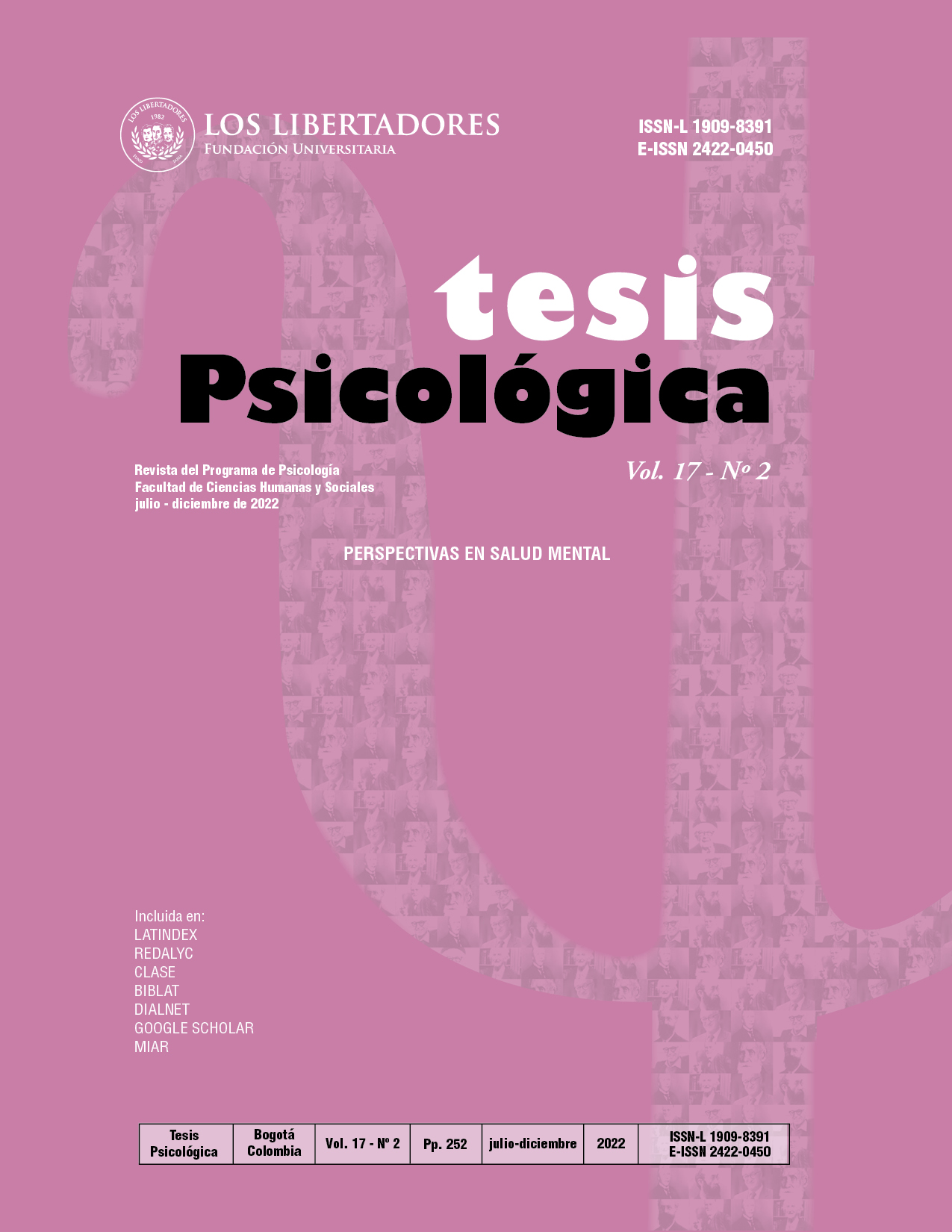Análisis fenomenológico interpretativo de la experiencia vivida en personas con diagnóstico de esquizofrenia
DOI:
https://doi.org/10.37511/tesis.v17n2a4Resumen
Antecedentes: la esquizofrenia se considera una experiencia intrínsecamente humana, que ha estado presente en todas las épocas y culturas. Representa la tendencia de la mente a desviarse de lo que se considera normal y aceptable, así como la inclinación de la sociedad a interpretar estas reacciones como signos de locura. Objetivo: Comprender la esquizofrenia desde la mirada de quienes la han vivido. Método: Se trató de un estudio cualitativo con enfoque fenomenológico interpretativo. Implicó la selección de tres participantes (un hombre y dos mujeres) entre los 35 y 57 años, y la realización de varias entrevistas semiestructuradas. Los datos se analizaron según los procedimientos del análisis fenomenológico interpretativo. Resultados: Los temas surgidos luego del análisis fueron: la persona en la esquizofrenia, el proceso de hospitalización, el tratamiento psiquiátrico, factores psicosociales de la esquizofrenia, esquizofrenia y suicidio, y servicios de salud mental. Para los participantes la esquizofrenia representó una experiencia angustiante y confusa, que trajo cambios significativos en la vida de cada uno de estos. Conclusiones: sus narrativas permitieron identificar posibles áreas problemáticas susceptibles de investigación en trabajos futuros.
Descargas
Referencias
Ådnanes, M., Melby, L., Cresswell-Smith, J., Westerlund, H., Rabbi, L., Dernovšek, M. Z., … Donisi, V. (2018). Mental health service users’ experiences of psychiatric re-hospitalisation-an explorative focus group study in six European countries. BMC Health Services Research, 18(1), 2–8. https://doi.org/https://doi.org/10.1186/s12913-018-3317-1
Asociación Americana de Psiquiatría. (2014). Manual diagnóstico y estadístico de los trastornos mentales (DSM-5). Editorial Médica Panamericana.
Brinkmann, S., & Kvale, S. (2018). Doing Interviews (Second edi; U. Flick, ed.). Sage.
Campo-Arias, A., & Herazo, E. (2015). El complejo estigma-discriminación asociado a trastorno mental como factor de riesgo de suicidio. Revista Colombiana de Psiquiatria, 44(4), 243-250. https://doi.org/10.1016/j.rcp.2015.04.003
Chevalier, A., Ntala, E., Fung, C., Priebe, S., & Bird, V. J. (2018). Exploring the initial experience of hospitalisation to an acute psychiatric ward. PLoS ONE, 13(9), 1-17. https://doi.org/10.1371/journal.pone.0203457
Cooke, A. (Ed.). (2017). Understanding psychosis and schizophrenia. Leicester: British Psychological Society. Recuperado de https://www.bps.org.uk/sites/www.bps.org.uk/files/Page - Files/Understanding Psychosis and Schizophrenia.pdf
Creswell, J. W., & Poth, C. N. (2017). Qualitative inquiry and research design: Choosing among five approaches. Thousand Oaks: Sage publications.
Davidson, L., & González-Ibáñez, À. (2017). La recuperación centrada en la persona y sus implicaciones en salud mental. Revista de La Asociación Española de Neuropsiquiatría, 37(131), 189–205.
Duque, H., & Aristizábal Díaz-Granados, E. (2019). Análisis fenomenológico interpretativo. Pensando Psicología, 15(25), 1–24.
Fierro, M., María, A., & Malcolm, J. (2017). The Psychopathology of Delusion of Control According to Subjective Experience. Revista Colombiana de Psiquiatría, (x x), 1–8. https://doi.org/10.1016/j.rcp.2017.02.004
Flick, U. (2018). Designing qualitative research (2nd ed.). London: Sage.
Forte, A., Buscajoni, A., Fiorillo, A., Pompili, M., & Baldessarini, R. J. (2019). Suicidal Risk Following Hospital Discharge: A Review. Harvard Review of Psychiatry, 27(4), 209–216. https://doi.org/10.1097/HRP.0000000000000222
Geekie, J., & Read, J. (2012). El sentido de la locura. Barcelona, España: Herder.
Hamman, C. (2017). The Subjective Experience of Individuals Diagnosed with Schizophrenia in the Western Cape, South Africa (Stellenbosch University). Stellenbosch University. Recuperado de https://scholar.sun.ac.za/bitstream/handle/10019.1/102965/hamman_subjective_2017.pdf?sequence=1&isAllowed=y
Hansen, H., Stige, S. H., Davidson, L., Moltu, C., & Veseth, M. (2018). How Do People Experience Early Intervention Services for Psychosis? A Meta-Synthesis. Qualitative Health Research, 28(2), 259–272. https://doi.org/10.1177/1049732317735080
Heffernan, S., Neil, S., Thomas, Y., & Weatherhead, S. (2016). Religion in the recovery journey of individuals with experience of psychosis. Psychosis: Psychological, Social and Integrative Approaches, 8(4), 346–356. https://doi.org/10.1080/17522439.2016.1172334
Henssler, J., Brandt, L., Müller, M., Liu, S., Montag, C., Sterzer, P., & Heinz, A. (2020). "Migration and schizophrenia: Meta-analysis and explanatory framework": Correction. European Archives of Psychiatry and Clinical Neuroscience, 270(6), 787. https://doi.org/10.1007/s00406-020-01136-9
Kamens, S. R., Cosgrove, L., Peters, S. M., Jones, N., Flanagan, E., Longden, E., Schulz, S., Robbins, B. D., Olsen, S., Miller, R., & Lichtenberg, P. (2019). Standards and Guidelines for the Development of Diagnostic Nomenclatures and Alternatives in Mental Health Research and Practice. Journal of Humanistic Psychology, 59(3), 401–427. https://doi.org/10.1177/0022167818763862
Katz, S., Friedlander, A., & Lichtenberg, P. (2019). Soteria house, a new service for preventing psychiatric hospitalization: three vignettes and a discussion. Harefuah, 158(7), 445–448.Kinderman, P. (2019). A Manifesto For Mental Health: Why We Need A Revolution In Mental Health Care. Springer Nature.
Lloyd‐Evans, B., & Johnson, S. (2019). Community alternatives to inpatient admissions in psychiatry. World Psychiatry, 18(1), 31.
López, C. A. (2011). Autonomía del paciente psiquiátrico: Capacidad, introspección y consentimiento informado.Bogotá: Universidad del Bosque.
Martínez, M. Á., Coca, M. C., Pérez, G., & Martínez, M. V. (2017). Escuchando la voz de las personas que escuchan voces. Revista Asociación Española de Neupsiquiatría, 37(131), 39–61. https://doi.org/10.4321/S0211-57352017000100003
Mathew, S. T., Nirmala, B. P., & Kommu, J. V. S. (2018). Meaning of Recovery Among Persons with Schizophrenia: A Literature Review. Journal of Psychosocial Rehabilitation and Mental Health, 5(1), 73–81. https://doi.org/10.1007/s40737-018-0111-7
Moncrieff, J., & Middleton, H. (2015). Schizophrenia: A critical psychiatry perspective. Current Opinion in Psychiatry, 28(3), 264–268. https://doi.org/10.1097/YCO.0000000000000151
Morelli, N., Fogler, J., Tembulkar, S., Graber, K., Lincoln, S. H., Bosquet Enlow, M., … D’Angelo, E. J. (2019). Potentially traumatic events in youth with and at clinical high risk for psychosis. Early Intervention in Psychiatry, 13(4), 805–809.
Olbert, C. M., Nagendra, A., & Buck, B. (2018). Meta-analysis of Black vs. White racial disparity in schizophrenia diagnosis in the United States: Do structured assessments attenuate racial disparities? Journal of Abnormal Psychology, 127(1), 104.
Pérez-Álvarez, M., García-Montes, J. M., Vallina-Fernández, O., & Perona-Garcelán, S. (2016). Rethinking Schizophrenia in the Context of the Person and Their Circumstances: Seven Reasons. Frontiers in psychology, 7, 1650. https://doi.org/10.3389/fpsyg.2016.01650
Pietkiewicz, I., & Smith, J. A. (2014). A practical guide to using Interpretative Phenomenological Analysis in qualitative research psychology. Czasopismo Psychologiczne Psychological Journal, 20(1), 361–369. https://doi.org/10.14691/CPPJ.20.1.7
Prophy, L., Roper, C., Hamilton, B., Tellez, J. J. J., & McSherry, B. (2016). Consumers and Carer perspectives on poor practice and the use of seclusion and restraint in mental health settings: Results from Australian focus groups. International Journal of Mental Health Systems, 10(6), 1–11.
Read, J. (2020). Bad things happen and can drive you crazy: The causal beliefs of 701 people taking antipsychotics. Psychiatry Research, 285(January), 112754. https://doi.org/10.1016/j.psychres.2020.112754
Read, J., & Dillon, J. (2017). Modelos de locura II. Barcelona: Herder Editorial.
Rezayat, F., Mohammadi, E., Fallahi-khoshknab, M., & Sharifi, V. (2019). Experience and the meaning of stigma in patients with schizophrenia spectrum disorders and their families: A qualitative study. Japan Journal of Nursing Science, 16(1), 62–70. https://doi.org/10.1111/jjns.12212
Silverman, D. (2013). Doing qualitative research: A practical handbook. London: SAGE publications limited..
Smith, J. A. (2019). Participants and researchers searching for meaning: conceptual developments for interpretative phenomenological analysis. Qualitative Research in Psychology, 16(2), 166–181.
Soneira, M. S. (2017). Usos de [ la ] locura : hacia el reconocimiento de nuevas lógicas interpretativas del sufrimiento humano Uses of madness : towards the recognition of new interpretations of human suffering. Salud Colectiva, 13(4), 713–729. https://doi.org/10.18294/sc.2017.1613
Stanton, K. J., Denietolis, B., Goodwin, B. J., & Dvir, Y. (2020). Childhood Trauma and Psychosis: An Updated Review. Child and Adolescent Psychiatric Clinics of North America, 29(1), 115–129. https://doi.org/10.1016/j.chc.2019.08.004
Taylor, S. J., Bogdan, R., & DeVault, M. (2015). Introduction to qualitative research methods: A guidebook and resource. Hoboken: John Wiley & Sons.
Verbeke, E., Vanheule, S., Cauwe, J., Truijens, F., & Froyen, B. (2019). Coercion and power in psychiatry: A qualitative study with ex-patients. Social Science & Medicine, 223, 89–96.
Wood, L., & Alsawy, S. (2018). Recovery in Psychosis from a Service User Perspective: A Systematic Review and Thematic Synthesis of Current Qualitative Evidence. Community mental health journal, 54(6), 793–804. https://doi.org/10.1007/s10597-017-0185-9
Wyder, M., Bland, R., Blythe, A., Matarasso, B. & Crompton, D. (2015). Therapeutic relationships and i nvoluntary t reatment o rders: Service users’ interactions with health‐care professionals on the ward. International Journal of Mental Health Nursing, 24(2), 181–189.
Wyder, M., Roennfeldt, H., Rosello, R. F., Stewart, B., Maher, J., Taylor, R., … Barringham, N. (2018). Our Sunshine place: A collective narrative and reflection on the experiences of a mental health crisis leading to an admission to a psychiatric inpatient unit. International Journal of Mental Health Nursing, 27(4), 1240–1249. https://doi.org/10.1111/inm.12487
Zaraza-morales, D. R. (2017). Encerrado a oscuras : significado de vivir con esquizofrenia para diagnosticados y sus cuidadores, Medellín-Colombia. Aquichan, 17(3), 305-315. https://doi.org/10.5294/aqui.2017.17.3.7
Descargas
Publicado
Número
Sección
Licencia

Esta obra está bajo una Licencia Creative Commons Atribución-NoComercial-















